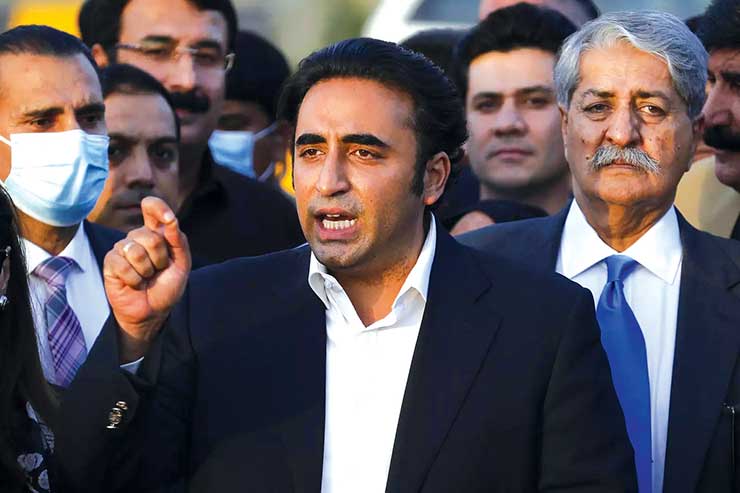For the first time in Pakistan’s political history, Imran Khan was defeated with 174 votes in the 225-member Pakistan National Assembly on March 8, ending his term 16 months ahead of time. He is the first serving prime minister to have been removed through a no-confidence motion, without overt military or judicial intervention.
Though the Army which has been playing a major role in that country’s politics appears to have maintained a semblance of aloofness but Imran Khan’s standoff with the military over the appointment of a new ISI chief and differences over foreign policy issues had created a rift with the military establishment.
The new Prime Minister, 70-year-old Shehbaz Sharif, younger brother of former three-time prime minister Nawaz Sharif, in his address to the Assembly said, “we want good ties with India but durable peace is not possible until the Kashmir issue is resolved,” and came out with all guns blazing attacking Imran Khan saying he did not make “serious and diplomatic efforts” when India abrogated Article 370 in August 2019.
Bajwa’s term as Army Chief ends in November this year and it remains to be seen what turn the relationship between the Army and the new government in Islamabad takes post his departure.
In Pakistan, no prime minister has been able to complete the full five-year term in office. Three military dictators have in the past overthrown democratically elected governments in Pakistan. On many other occasions, presidents with military backgrounds or military support sent many prime ministers home.
The military has always had the upper hand over the civilian government in matters of how the country should be run, nuclear doctrine framed, and foreign policy nuanced. Whenever a prime minister became too powerful and popular, the military overthrew him in the name of saving the country.
Even Khan’s rise to power in 2018 had the backing of the military which sought to convey the impression that the prime minister would appear to be more in charge. However, the military appeared to gradually becoming unhappy with Khan with the main cause being that Khan could not do much, despite no credible and robust Opposition breathing down his neck in Pakistan.
The country is riddled with numerous problems ranging from unemployment, inflation, and depleting forex reserves. It is crippled by poor infrastructure for education, health care, road connectivity, besides water and power supplies.
While Khan’s refusal to clear the appointment of the ISI chief might have been a trigger, he and the military have also differed on who should be the next army chief. Besides, Khan and the military did not see eye to eye on several issues on external relations ranging from Khan’s support for Russia’s President Vladimir Putin by being with him in Moscow on February 24 when Russian forces invaded Ukraine.

General Bajwa made his differences with Khan public by saying the invasion by Russia was very unfortunate and a huge tragedy that could not be condoned and must be stopped immediately.
Since coming to power in 2018, Khan’s stand had become anti-American, and he had sought to move closer to China and Russia. But Gen Bajwa said that Pakistan shares a long history of excellent and strategic relationship with the US, which remains “our largest export market”.
“Pakistan has excellent defence and economic ties with Ukraine while relations with Russia have been cold for a long time,” Bajwa also said.
There were several other major differences with the Pakistan Army feeling that Khan had not taken a strong stand regarding human rights violation by the Taliban. Bitter with the Taliban as it is losing soldiers in attacks near their mutual border, Pakistan’s military wants the Taliban to control extremist groups that are now spreading violence in Pakistan.
The Pakistan Taliban, a terror outfit different from the Afghan Taliban, targets the military posts and installations with the declared aim to establish sharia, the Islamic law, in Pakistan. Imran Khan struck a deal with the Pakistan Taliban last year that led to a month-long ceasefire. This happened in October-November 2021 in the shadow of Khan-Army differences over the appointment of the ISI chief. The Pakistan Taliban resumed attacks on the Pakistan Army sites in December.
In the prevailing scenario, Pakistan is an important player in the regional power play between Russia, China and the US as it is on the cross roads.
Since its formation in 1947, Pakistan has always been a focal point for the big powers specially China and the US who have always sought to get that country to cosy up to them.
In the present day scenario, Pakistan has numerous problems to contend with which include reviving its flagging economy, stabilising borders with Afghanistan on the Durand Line and rebalancing its ties with the major actors in the Middle East, including Iran, UAE, Saudi Arabia and Turkey.
Each of these is a major challenge for the new regime in Islamabad. After Imran Khan’s outburst against the US, the Shehbaz government has indeed a tough job on its hands to smoothen out ties with Washington.
With Beijing and Washington too having none too good relations, it will be a tight rope walk for Shehbaz. The Ukraine crisis is a sensitive issue and considering that Imran Khan was in Moscow when Ukraine invasion took place, it is indeed an uphill task for the new government to respond to it on the diplomatic front. So, all in all, it is a tough path ahead for the new government in Pakistan with a spate of problems left behind by Imran Khan who had dreamt of a “Naya Pakistan.”
– The writer is a senior journalist and media consultant. The views expressed are of the writer and do not necessarily reflect the views of Raksha Anirveda
– The writer is a senior journalist and media consultant. The views expressed are of the writer and do not necessarily reflect the views of Raksha Anirveda.














